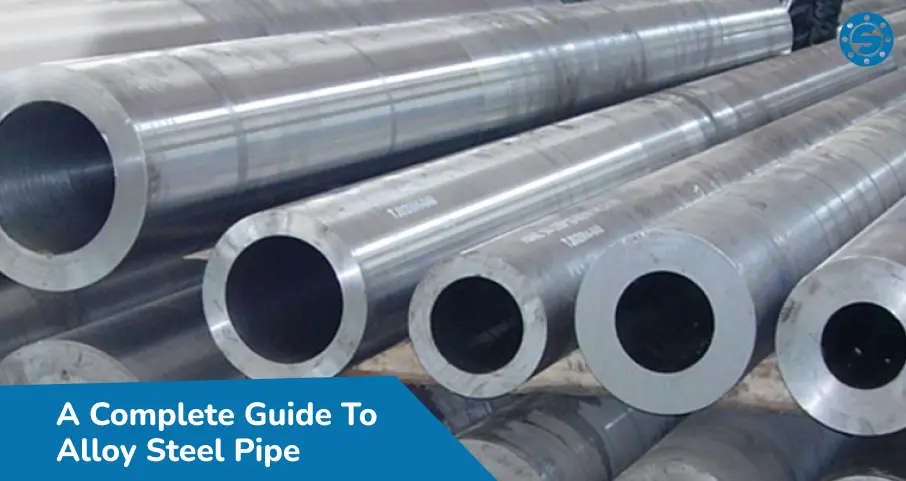A Complete Guide To Alloy Steel Pipe

What is Alloy Steel Pipe?
Alloy steel pipes are made from alloyed steel, which includes a base of carbon steel combined with various elements such as nickel, manganese, silicon, and chromium. These additional elements are included in varying proportions to impart specific desired characteristics to the steel. The incorporation of these alloying elements enhances the mechanical properties of the pipes, such as their strength and resistance to corrosion, while also providing improved physical properties for specialized applications. Alloy steel pipes are available in different grades, making them versatile and suitable for a wide range of uses across multiple industries. Their unique composition allows for enhanced performance in demanding environments.
Types of Alloy Steel Pipes
There are different types of alloy steel pipes, each suited for specific applications:
- Chromium-Molybdenum Pipes: Known for their high strength and corrosion resistance, ideal for power plants and refineries.
- Nickel Alloy Pipes: Offer excellent toughness and resistance to extreme temperatures, suitable for chemical processing and petrochemical industries.
- Manganese Alloy Pipes: Provide enhanced wear resistance, commonly used in construction and heavy machinery.
Applications of Alloy Steel Pipes
Alloy steel pipes are used in a wide range of industries due to their enhanced properties:
- Oil and Gas Industry: Used for transporting crude oil, natural gas, and refined products under high pressure and temperature conditions.
- Power Generation: Ideal for boiler tubes, heat exchangers, and other high-temperature applications.
- Petrochemical Plants: Used in processing and transporting chemicals that require pipes with high corrosion resistance.
- Construction: Provide structural support in buildings, bridges, and other infrastructure projects.
Alloy Steel Pipes of Physical Properties
Chemical Composition Alloy Steel
The chemical composition of alloy steel pipes varies depending on the specific grade used. Commonly used grades include 4140 (chromium-molybdenum), 4130 (chromium-molybdenum-silicon), 52100 (chromium), 1020 (carbon), 8620 (nickel-chromium-molybdenum), and T304/L (stainless steel). Each grade has unique properties and characteristics, making it suitable for different applications.
Typical chemical composition for alloy steel pipes includes:
Element | Composition (%) |
Carbon | 0.05-0.15 |
Manganese | 0.30-0.60 |
Phosphorus | 0.025 max |
Sulfur | 0.025 max |
Silicon | 0.50-1.00 |
Chromium | 1.00-1.50 |
Molybdenum | 0.44-0.65 |
These elements contribute to the strength, toughness, and corrosion resistance of the alloy steel pipes, making them ideal for various industrial applications.
Alloyed Steel of Mechanical Properties
Alloy steel pipes are typically stronger than traditional carbon steel pipes due to the addition of alloying elements. They have greater temperature resistance and better weldability than carbon steels because of their lower carbon content levels. Additionally, alloy steel pipes tend to be more ductile than standard carbon steels when exposed to various temperatures or pressures.
Typical mechanical properties for alloy steel pipes include:
Property | Value |
Tensile Strength (MPa) | 415 min |
Yield Strength (MPa) | 205 min |
Elongation (%) | 30 min |
These properties make alloy steel pipes ideal for high-stress and high-temperature applications, offering both strength and flexibility.
Alloying Elements
Commonly used alloying elements and their effects are listed in the table given below.
Alloying Elements | Effect on the Properties |
Chromium | Increases Resistance to corrosion and oxidation. Increases hardenability and wear resistance. Increases high temperature strength. |
Nickel | Increases hardenability. Improves toughness. Increases impact strength at low temperatures. |
Molybdenum | Increases hardenability, high temperature hardness, and wear resistance. Enhances the effects of other alloying elements. Eliminate temper brittleness in steels. Increases high temperature strength. |
Manganese | Increases hardenability. Combined with sulfur to reduce its adverse effects. |
Vanadium | Increases hardenability, high temperature hardness, and wear resistance. Improves fatigue resistance. |
Titanium | Strongest carbide former. Added to stainless steel to prevent precipitation of chromium carbide. |
Silicon | Removes oxygen in steel making. Improves toughness. Increases hardness ability |
Boron | Increases hardenability. Produces fine grain size. |
Aluminum | Forms nitride in nitriding steels. Produces fine grain size in casting. Removes oxygen in steel melting. |
Cobalt | Increases heat and wear resistance. |
Tungsten | Increases hardness at elevated temperatures. Refined grain size. |
Grades of Alloy Steel Pipe
There are several grades of alloy steel pipes, each with unique properties tailored to specific applications. The most common grades include ASTM A335 Alloy Steel Pipes P5, P9, P11, P22, and P91. Each of these grades has distinct characteristics in terms of tensile strength, yield strength, elongation, and resistance to corrosion and oxidation.
Maintenance of Alloy Steel Pipe
To maintain alloy steel pipes, conduct regular inspections and clean them to prevent damage. Apply protective coatings and use cathodic protection to guard against corrosion. Control moisture and limit exposure to corrosive chemicals. These practices help extend the lifespan and ensure the optimal performance of the pipes.


